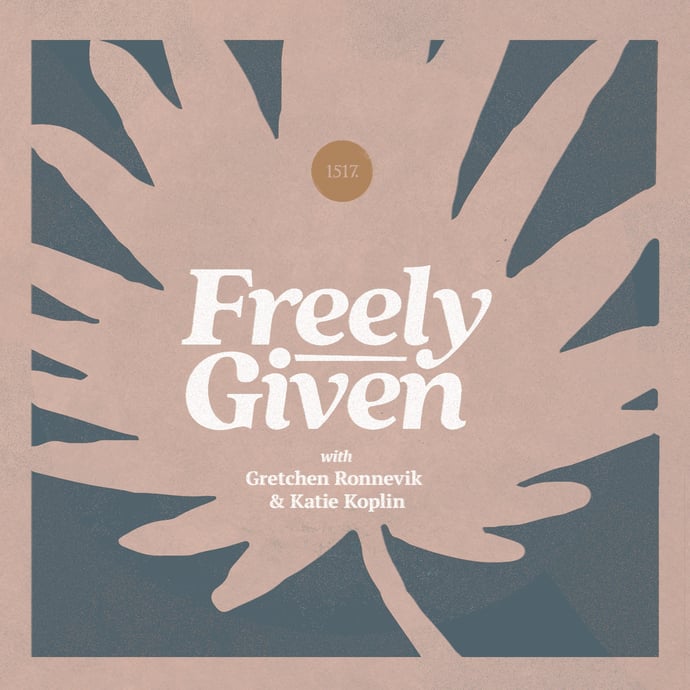In this episode we talk about the documentary of "Shiny Happy People" and this part of American Church history with an explosion of legalistic ideals that lacked Christ.
Podcasts
Each 1517 Podcast is dedicated to delivering Christ-centered content through weekly, monthly, and seasonal audio platforms. Listen online or on your favorite podcasting app.
Gretchen Ronnevik
- All Authors
- Aaron Zimmerman
- Adam Francisco
- Amy Mantravadi
- Blake Flattley
- Bob Hiller
- Bradley Gray
- Brian W. Thomas
- Bror Erickson
- Bruce Hillman
- Caleb Keith
- Chad Bird
- Chris Rosebrough
- Christopher Gillespie
- Cindy Koch
- Craig Donofrio
- Dan van Voorhis
- Daniel Deen
- Daniel Emery Price
- Darrin Sheek
- David Andersen
- David Rufner
- David Zahl
- Debi Winrich
- Delwyn Campbell
- Donavon Riley
- Doug Klembara
- Edward Killian
- Elyse Fitzpatrick
- Erick Sorensen
- Flame
- Grant Klembara
- Gretchen Ronnevik
- Haroldo Camacho
- Jacob Smith
- Jared C. Wilson
- Jeff Mallinson
- Jeffrey Pulse
- Jessica Thompson
- Jim Nestingen
- Joel Fitzpatrick
- Joel Hess
- John Andrew Schreiner
- John Bombaro
- John T. Pless
- John W. Hoyum
- John Warwick Montgomery
- Katie Koplin
- Kelsi Klembara
- Ken Sundet Jones
- Magnus Persson
- Matt Popovits
- Michael Berg
- Michael Horton
- Nick Lannon
- Paul Koch
- Peter Nafzger
- Philip Bartelt
- Raleigh Sadler
- RJ Grunewald
- Robert Kolb
- Rod Rosenbladt
- Ron Hodel
- Sam Leanza Ortiz
- Sarah Condon
- Sarah Crowder
- Scott Davis
- Scott Keith
- Steven Paulson
- Tanner Olson
- Troy Neujahr
- Uwe Siemon-Netto
- Wade Johnston
- William Cwirla
-
Author, speaker, and poet Tanner Olson is with us for this episode to talk about the vocation of being a poet. We talk about sharing hope, the writing process, and understanding that our work is for someone.
-
We are excited to welcome the rapper, Flame, onto the podcast to share about the idea of vocation, and where our good works belong.
-
In our series about prescriptive vs descriptive, we walk through the story of Esther. Though this book does not mention God, it refers to the promises of God to redeem.
-
We are excited to discuss David Zahl's book "Low Anthropology." Gretchen Ronnevik and Katie Koplin heard him speak last fall.
-
As we work through some prescriptive vs descriptive passages of the Bible, especially in regard to women, we start with Tamar, and how she falls in line to Jesus' genealogy.
-
We are preparing for summer, and sharing our summer book club picks, and then talking about the conference on Galatians that 1517 just had in Arkansas. We talk a bit about the circumcision debate, our tendency toward legalism, and how we even often prefer using softer language than the Bible.
-
Have you ever heard the illustration about the janitor in heaven? In this episode Gretchen Ronnevik and Katie Koplin what it means to "store up your treasures in heaven."
-
This is our monthly book club episode, where we discuss "Giants in the Earth" by O.E. Rölvaag. This novel was originally written in Norwegian, and translated to English in the 1920s.
-
Gretchen and Katie are back together to talk about how the resurrection impacts daily life. While apologetics are important, to analyze "if" the resurrection happened, this episode is the step beyond that, and asks how the resurrection changes our outlook and our daily interactions.
-
Joy isn't getting what you want when you want it. We can't produce joy, but we can produce pleasure, but we often get those two things confused.
-
What is the difference of being a theology of the cross, and the theology of glory?
